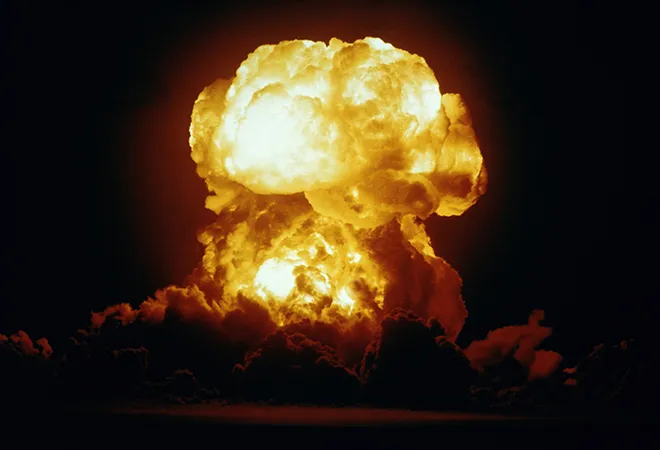-
CENTRES
Progammes & Centres
Location

The changing dynamic of concurrent geopolitics has brought great power politics to the fore and, with it, the centrality of nuclear weapons. The current global nuclear order consists of multiple actors increasing the complexity of arms control negotiations and treaties. This fact is highlighted by the withdrawal of the United States (U.S.) from the Joint Comprehensive Plan of Action (JCPOA) with Iran, and President Donald Trump’s meeting with North Korean leader Kim Jong-un. Moreover, the Cold War-era Intermediate-range Nuclear Forces (INF) Treaty has been abrogated by both the US and Russia.
John F. Kennedy, the 35th U.S. President, had predicted that the world will witness multiple nuclear powers. However, the Cold War geopolitical dynamic confined the dominance of global nuclear order to the two superpowers. The Mutually Assured Destruction mechanism meant neither side could contemplate initiating nuclear exchange. This assurance, coupled with bipolarity, simplified the arms control negotiations leading to the Strategic Arms Limitation Talks (SALT I in 1972 and SALT II in 1979), Strategic Arms Reduction Treaty I (START I) entering into force in 1994 and the New START currently in force since 2011. Along with these, the INF treaty ratified in 1988 banned the deployment of ground based intermediate range weapons, which otherwise puts Europe in the crosshairs.
The bipolarity underlying these arms control measures no longer exists, and major nuclear powers continue to fail to arrive at a consensus on new measures required for arms control. Even if a consensus is found, the absence of a strong enforcer makes the rules inefficient. The shifting balance of power and the withdrawal from global engagements weaken the American position as a reliable enforcer, not to mention the negative effect on its extended deterrence. This is an alarming situation given China’s rapid pace of military modernisation, especially the development of a missile force. China insists that Taiwan should be reunited with the mainland using military force if necessary. It deployed intermediate range missiles for this purpose, complicating the deterrence dynamic in the Western Pacific.
Therefore, the abrogation of the INF treaty is seen as useful to the U.S., allowing it to deploy more intermediate range missiles in Asia to counter China. The U.S. is following the logic that had seen it abrogate the Anti-Ballistic Missile Treaty in 2002. It intends to maintain advanced capabilities and possess flexibility for deterrence. The result of this thinking is increasing hostility from the U.S. administration against arms control measures. The deployment of intermediate range weapons is more about political posturing on the trans-Atlantic side, but the trans-Pacific deployments possess pure military logic. Russia too will start deploying its missiles as a counter to China and to balance American deployments in Asia. These actions would tend to initiate an action-reaction cycle that forces China to further increase its arsenal and as a result, India, and eventually Pakistan. Proliferation will be on the rise and adherence to ‘first use’ by states like Pakistan increases the danger of nuclear weapon use.
A new set of global rules relevant to the current situation must be adopted to deter such dangers. However, the fundamental assumptions and conditions of the global geopolitical landscape have changed since the Cold War, thus undermining the authority of traditional actors (the U.S. and Soviet Union/Russia) to set norms for others. The US finds itself differing within the administration and with its allies. Moreover, the 2010 US Nuclear Posture Review emphasised nuclear weapons contradicting former President Barack Obama’s efforts for global disarmament. The U.S. withdrawal from JCPOA and the reimposition of sanctions caused a rift with its allies in Europe, while the Asian allies South Korea and Japan differ over the North Korean strategy. Moreover, the division within the U.S. administration regarding rapprochement with Russia and the ongoing trade war with China make discussions on drafting new rules for the fluctuating global nuclear order difficult. Amidst this situation, China has emerged a major nuclear power with increasing missile capabilities being unconstrained by the INF treaty.
This situation signals that major powers are divided over political and economic affairs, constraining attempts to find a consensus on new norms and rules for the global nuclear order. Therefore, the de facto nuclear weapon states such as India possessing a nuclear posturing that is not directly related to the US-Russia nuclear perplexity, but feeling the impact of changing dynamic at the global level, need to take charge. India should be able to find suitable partners such as Israel in building consensus for new rules.
These new rules should be based on emerging multipolarity and the changing character of warfare. They also should consider the impact of hypersonics and cyber warfare on nuclear weapons and delivery platforms. More importantly, the responsibility to enforce the rules and the punishment mechanism in response to breaking the rules need to be stringent, yet acceptable to all the nuclear powers
The views expressed above belong to the author(s). ORF research and analyses now available on Telegram! Click here to access our curated content — blogs, longforms and interviews.

Vidya Sagar Reddy was a Junior Fellow in the Nuclear and Space Policy Initiative of the Observer Research Foundation, New Delhi. ...
Read More +